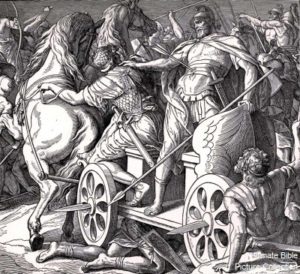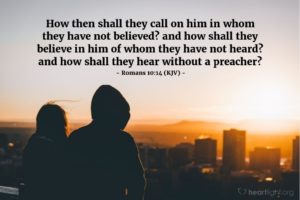JULY 27 TODAY’S READING FROM THE ONE YEAR BIBLE- 2 CHRONICLES 19:1-20:37; ROMANS 10:14-11:12; PSALMS 21:1-13; PROVERBS 20:4-6
TODAY’S READING FROM THE OLD TESTAMENT- 2 CHRONICLES 19:1-20:37.
Despite being in disguise, Ahab was killed as predicted by the prophets. By the mercy of the Lord, Jehoshaphat was spared, even though he was clothed in the battle to appear to be Ahab! Although Jehoshaphat escapes death, he does not escape the notice of God. He is to be held accountable for his actions.
Today’s reading begins with Jehoshaphat being reprimanded by the prophet Jehu, the son of Hanani, for his unholy alliance with King Ahab, even though Ahab was his son’s father-in-law. The true prophets of God were not afraid to speak the truth. Jehu’s father, Hanani, had spent time in jail as a result of telling the truth to King Asa, so he knew that speaking the truth may bring uncomfortable consequences (2 Chronicles 16:7-10).
2 Chronicles 19:2 2 Jehu the son of Hanani the seer went out to meet him and said to King Jehoshaphat, “Should you help the wicked and love those who hate the LORD and so bring wrath on yourself from the LORD?
This should make us think about our own lives. Do we compromise our obedience to the Lord? Do we flaunt His counsel? Do we aid the cause of the wicked? Are we in an unholy alliance with those who hate the Lord and further their cause?
The New Testament has some strong warnings of those who make unholy alliances. Paul writes about the unequal yoke:
2 Corinthians 6:14 14 Do not be bound together with unbelievers; for what partnership have righteousness and lawlessness, or what fellowship has light with darkness?
2 Corinthians 6:17 17 “Therefore, COME OUT FROM THEIR MIDST AND BE SEPARATE,” says the Lord. “AND DO NOT TOUCH WHAT IS UNCLEAN; And I will welcome you.”
Sadly, Jehoshophat did not learn from this mistake but he repeats it again, making an alliance with Ahaziah, the next King of Israel:
2 Chronicles 20:35-37 35 After this Jehoshaphat king of Judah allied himself with Ahaziah king of Israel. He acted wickedly in so doing. 36 So he allied himself with him to make ships to go to Tarshish, and they made the ships in Ezion-geber. 37 Then Eliezer the son of Dodavahu of Mareshah prophesied against Jehoshaphat saying, “Because you have allied yourself with Ahaziah, the LORD has destroyed your works.” So the ships were broken and could not go to Tarshish.
There were many positive features about the reign of Jehoshaphat that was recorded in 2 Chronicles 19 and 20.
2 Chronicles 19:3 3 “But there is some good in you, for you have removed the Asheroth from the land and you have set your heart to seek God.”
Jehoshaphat helped to turn people back to the Lord (2 Chronicles 19:4). He appointed God-fearing judges and blessed them:
2 Chronicles 19:7 7 “Now then let the fear of the LORD be upon you; be very careful what you do, for the LORD our God will have no part in unrighteousness or partiality or the taking of a bribe.”
One aspect of any spiritual revival is that the participants experience “the fear of the LORD being upon them”. The fear of the Lord is having a very strong, healthy awareness of God’s holy presence, to the degree that you would only want to do what is pleasing to Him. There is a fresh appreciation for God’s holiness, love, truth, purpose, and the grace of our Lord Jesus as He moves among us. There is also an awareness of the danger of incurring God’s wrath by sinning against the Lord (2 Chron 19:10). This revived spiritual state will deter the practice of sin. Those who truly fear the Lord will put their trust in Him.
Not only were the judges, but also the leaders and the heads of the families were commanded to fear the Lord:
2 Chronicles 19:9 9 He gave them these orders: “You must serve faithfully and wholeheartedly in the fear of the LORD. (NIV)
Chapter 20 reminds us that ‘the battle belongs to the Lord’ (2 Chronicles 20:15).
When Jehoshaphat learns that a vast army of Moabites, Ammonites, and Meunites had already encroached upon their territory of En Gedi, and had plans to war against him, he proclaims a fast for all Judah.
A fast is customarily called when people are facing a calamity and there is a recognized need to make a serious appeal to the Lord. It is a concentrated time for seeking God’s wisdom and help in the crucial hour. By abstaining from the daily routine of food preparation and eating, they could devote that extra time to humbling themselves, repenting of their sin and asking for God’s forgiveness and help. Their hunger pains would remind them of their weakness and dependence upon the Lord. The discomfort of not receiving their daily bread would reinforce their feelings of penitence.
Jehoshaphat calls a solemn assembly and prays in front of the temple courtyard. He begins by hallowing the Name of the Lord, praising God for Who He is and what He has done. He also affirms the fact that they are standing in grace, the land God had promised ‘His friend’ Abraham and delivered into their hands. He affirms the promise that the temple in Jerusalem represents a place where their prayers can be heard. (It is a place-holder for the one perfect mediator- Christ Jesus). Those in the temple (prefiguring those ‘in Christ Jesus’) can cry out in His Name and God will hear and save us.
Jehoshaphat spells out the present reality- The enemy outnumbers us, and we do not know what to do. And then he proclaims the faith of God’s people: “Our eyes are on You!” (2 Chronicles 20:12).
The Spirit of the Lord comes upon Jehaziel, the son of Zechariah, a Levite and descendant of Asaph with a prophetic word.
2 Chronicles 20:15 15 and he said, “Listen, all Judah and the inhabitants of Jerusalem and King Jehoshaphat: thus says the LORD to you, ‘Do not fear or be dismayed because of this great multitude, for the battle is not yours but God’s.’”
David had spoken similar words when facing Goliath (1 Samuel 17:47).
Jehaziel continues to prophesy:
2 Chronicles 20:17 17 You will not have to fight this battle. Take up your positions; stand firm and see the deliverance the LORD will give you, O Judah and Jerusalem. Do not be afraid; do not be discouraged. Go out to face them tomorrow, and the LORD will be with you.'”
This reminds us that as Christians facing various spiritual battles, we are called to ‘take up our position’ and ‘stand firm’.
Ephesians 6:13-14 13 Therefore put on the full armor of God, so that when the day of evil comes, you may be able to stand your ground, and after you have done everything, to stand. 14 Stand firm then.
The people responded to the revelation of God’s Word with worship and praise. (2 Chronicles 20:18-19). Notice their various body postures as they gave God their worship. Some bowed their heads, some prostrated themselves before the Lord, some stood up to praise the Lord with a very loud voice!
In this battle, Jehoshaphat exhorts his troops to put their trust in the Lord and His Word. He appointed men to sing to the Lord and to praise Him for the splendor of His holiness as they went out at the head of the army, saying, “Give thanks to the Lord, for His love endures forever!” As they sang, the LORD set ambushes against the invading army and defeated them! Not one of the enemy troops escaped alive. It took ‘three days’ to collect the spoil. On the fourth day the people of Judah had a praise celebration in the valley of Berakah (meaning ‘blessing’). The valley was named ‘blessing’ because of what took place there.
What will you name your valleys?
The final events recorded in Jehoshaphat’s life underscore the great cost of his unholy alliance with Ahaziah (20:35-37). There is an example of God opposing the proud. Jehoshaphat, the King of Judah, agreed to engage in an impressive construction project with Ahaziah, the King of Israel. Together they built a fleet of trading ships. After they were built, the prophet Eliezer prophesied that “the Lord would destroy what you have made” (2 Chronicles 20:37). The ships were wrecked and were never able to be launched for their much-anticipated trading ventures.
TODAY’S READING FROM THE NEW TESTAMENT – ROMANS 10:14-11:12
Remember that Paul’s letter to the Romans is a pastoral letter, and not merely a doctrinal one. How are Jewish and Gentile believers to relate to one another? He is making it clear that there is One Messiah for both Jew and Gentile and His Name is Jesus. He is calling both Jews and Gentiles to believe the Gospel of the One True God concerning His Son.
Paul is also explaining what was happening with the Jewish people in the context of the overarching plan of redemption. Although many Jews were rejecting the message, God was not finished with them yet!
When Paul talks about the unbelief among those who were currently blinded by an apostate Judaism that he was once a part of, you can imagine his heart breaking. He shows how the God-given revelation given to Moses had been misinterpreted and turned into a counterfeit religion. It mandated outward conformity to a system of rabbinical tradition, rituals and futile self-justifying attempts to keep the commandments. They were ignorant of the purpose of the Law and the gift of God’s righteousness. Instead they created their own brand of pseudo-righteousness. They failed to see that Christ was the end of the Law for righteousness for all who believe.
Paul reminds his readers of the privilege of the Jews. We are to respect them for it. They had the oracles of God, the Law and the Prophets. That Word of God was made freely available and accessible to them by God’s grace. That revelatory Word clearly pointed to Christ.
In the Old Testament, Moses spoke of this privilege of having the Word of God, the Torah, at hand, in Deuteronomy 30:14
Deuteronomy 30:14 14 “But the word is very near you, in your mouth and in your heart, that you may observe it.
God gave His Word to them. His holy promise. It is accessible to them. They did not have to go to heaven to get it! They did not have to descend into the Abyss! They just had to believe the Word in their hearts. They did not have to lift a finger. Just believe.
Paul takes these same Scriptures about the written Word and applies them to Christ, the Living Word! If only the Jews would forsake their manufactured folk religion and believe THE GOD-GIVEN WORD in their hearts! Jesus is the Word. He is the end of the Law for righteousness to everyone who believes. His death on the cross fulfills the Law’s demand for our just penalty for sin. His life in us by the Holy Spirit fulfills the demands on the Law in us as we walk by faith after the Spirit. The gospel calls us to faith. Believe and you will receive.
Salvation is a free gift. But God uses the activities of human beings as His means in the work of salvation. He uses the activities of ‘calling’, ‘believing’, ‘hearing’, ‘preaching’, ‘going’ and ‘sending’. And all these activities are done in relationship to His Word.
Notice the actions involved:
Romans 10:14-15 14 How then will they call on Him in whom they have not believed? How will they believe in Him whom they have not heard? And how will they hear without a preacher? 15 How will they preach unless they are sent? Just as it is written, “HOW BEAUTIFUL ARE THE FEET OF THOSE WHO BRING GOOD NEWS OF GOOD THINGS!”
Although Romans 10:14- 15 has an application to the ministry of the Word going forth today from the believers in Christ’s church, in the context of the letter, Paul is speaking about Israel. They have already had the Word of God, the message of Christ, brought to them. The apostles were sent. The message was preached. The message was heard. Some who heard, believed, and called upon the Lord. But some through their unbelief, have had their heart hardened to the gospel. Yet notice that God says that He has outstretched His hands in an offer of mercy ALL THE DAY LONG.
Romans 10:21 21 But as for Israel He says, “ALL THE DAY LONG I HAVE STRETCHED OUT MY HANDS TO A DISOBEDIENT AND OBSTINATE PEOPLE.”
However, God gives some up to their hardened hearts. Yet by the working of the Word and corresponding faith, some hearts are softened. For the most part, Israel as a nation, has not yet believed.
Paul is convinced that God has not yet rejected His people whom He foreknew. Paul was once Saul, a persecutor of the church, and yet God has shown His mercy in revealing to him the truth about Jesus, saving him from the wrathful judgment his sins deserve. And like Elijah, whom God reminded was not the only surviving believer of his generation but part of an unknown remnant, Paul is convinced that he is not a lone recipient of mercy among the Jews. There is a remnant of Jews reserved for salvation, according to God’s gracious choice.
Paul sees that God is using the hardening of the hearts of His people, Israel, to provide an impetus for the gospel to go to the world of the Gentiles. He is also using the receptivity of the Gentiles to make the Jews jealous for the experience of a personal transformative relationship of peace with God!
TODAY’S READING FROM THE BOOK OF PSALMS – PSALMS 21:1-13
Songs are so often written to glorify the trivial, or honor that to which honor is not due. But here is a song written to glorify God and honor the Lord who gives strength, salvation, blessing, life, health and every good thing.
Psalm 21 is considered a sequel to Psalm 20. In Psalm 20, prayers and petitions are offered that express the desires of the king’s heart. In Psalm 21 those prayers, petitions and heart’s desires are answered. In Psalm 20 victory is asked for. In Psalm 21 thanks is given to God who has given the victory!
In Psalm 20 petition is made that the anointed King be preserved. In Psalm 21 the King is full of praise for the favor He has been shown in having his prayers answered (verses 1-6).
The king has been made joyful with gladness in His presence. Splendor and majesty have been set upon him.
In verses 7-13, we hear a declaration of faith. The king trusts in the Lord and is confident that He will give him victory over all his enemies.
When you read this Psalm you can think of King Jesus as the Anointed One standing in place of King David. Though the wicked devise a plot against God’s anointed Son, they will not succeed. The gates of hell shall not prevail against Christ and His church!
Psalm 21:13 13 Be exalted, O LORD, in Your strength; We will sing and praise Your power.
TODAY’S READING FROM THE BOOK OF PROVERBS- PROVERBS 20:4-6
Proverbs 20:4-6 4 The sluggard does not plow after the autumn, so he begs during the harvest and has nothing. 5 A plan in the heart of a man is like deep water, but a man of understanding draws it out. 6 Many a man proclaims his own loyalty, but who can find a trustworthy man?
PRAY FOR THE NATIONS- JAPAN
(from Prayercast.com)
Here is a video- https://www.youtube.com/watch?v=1in5lYEM03A
Pray for the Gospel to take root in Japanese culture and no longer be perceived as a western religion.
- Pray for drifting, over-worked, and anxious youth to find freedom in Christ.
- Pray for the unity of God’s Spirit to demolish barriers dividing the 120 different denominations.
Japan uniquely blends an ancient civilization’s rich traditions, with an incredibly modern and technologically advanced culture. Skyscrapers mix with ancient temples to form a fascinating landscape and culture that continues to enthrall visitors from around the world. Japan has been a leader in technology and manufactured consumer goods for decades, especially electronics and automobiles. In the 19th century, they embraced a Western-style constitutional monarchy after centuries of feudalism. After World War II, the country rejected militarism, totalitarianism, and Emperor-worship in favor of pacifism and democracy.
Japan achieved remarkable growth after the devastation of World War II, becoming the third largest economy in the world. Recent recessions hit hard, and reforms have been enacted to revive the economy. While the constitution forbids the armed forces from engaging in conflicts outside its borders, ongoing disputes with China, North Korea’s growing missile capabilities, the rise of international terrorism, and a desire to contribute to international peacekeeping initiatives have prompted military expansion. Japan boasts one of the highest life expectancies. But with a high value on the workplace, less people getting married, and a growing acceptance of abortion and contraceptives, Japan now has one of the world’s lowest birth rates, and a quarter of the Japanese are over 65. If Japan’s fertility rate does not rise by almost double, the population will continue to decrease. Violence and crime are on the rise. Rampant suicide (30,000/year), teenage prostitution, high divorce rates, and growing social anxieties all reveal widespread despair and hopelessness, exaggerated by the grip of materialism.
The majority of Japanese do not consider themselves religious, yet their cultural identity and the way they live their lives is deeply spiritual. Most identify with Buddhism (69%), but the average person practices a mix of Buddhist, Shinto, Daoist, Confucian, Atheistic, and even Christian beliefs. Only about 1% call themselves Christian, and about .3% are Evangelical. A massive 120 million are still waiting to hear the Gospel, making it one of the world’s largest unreached people groups. Christianity is often viewed as foreign, and an authentic Japanese expression of faith is needed. Natural disasters, economic decline, an aging society, and feelings of social isolation have provoked spiritual searching and an openness to the Gospel. But only a move of God will bring spiritual breakthrough.
PRAYER: Father, we thank You for the gift of Your Word and the victory that is ours in Christ Jesus. We can stand firm in the perfect provision of a right standing with You in Your Son and take confidence in Your unfailing promises. We ask that You send laborers into the harvest who will be faithful to preach Your Word. We pray that You will cause ears to hear, and hearts to believe. Keep us from unholy alliances and projects not founded on heavenly wisdom. In Jesus’ Name. Amen.
